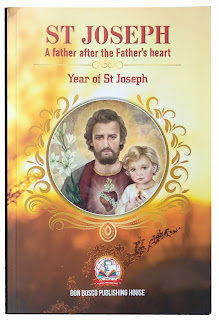Holy Eucharist
The Holy Eucharist is a
thanksgiving to God for all the blessings that he pours on his faithful. It is
the sacrifice of the Body and Blood of Jesus Chris which is made present in a
non bloody manner. It is a memorial of Christ and his body. It is the memorial
of Jesus’ passion, death and resurrection.
We carry out the
command of Jesus when we celebrate the Eucharist. It was he himself who gave
the command when he said, “Do this in memory of me.” We offer to the Father the
gifts that he himself has given us: the bread and wine, which by the power of
the Holy Spirit becomes the body and blood of Christ. Thus, Christ is truly and
mysteriously made present.
In the Eucharist, the
church sings God’s glory in the name of creation. This is made possible only
through Christ. Christ invites the faithful to offer praise to the Father
through Him and with Him.
The recalling (anamnesis)
of this event is done during the mass. In the sense of Sacred Scripture, the
memorial is not merely the recollection the past events, but also the
proclamation of the works of God. The
Church expects baptized Catholics to attend mass at least on Sundays and other
days of obligation. The Holy Eucharist as instituted by Christ himself, when he
had his last supper with his disciples. The Eucharist is also called the Holy
Sacrifice, Breaking of the Bread, the Lord’s Supper. The word ‘Eucharist’ is
derived from the Greek words, ‘Eucharistein’ and ‘Eulogein’, which recall the
Jewish blessing that proclaim God’s works of creation, redemption and
sanctification.
The sacrifice of Christ
and of the Holy Eucharist are one and the same. What it means is that the same
Christ who was sacrificed on Calvary is also sacrificed on the altar. The only
difference is that the mode is different. What was once offered as a bloody
sacrifice is now offered as an unbloody sacrifice. The Church too, offers
herself with Christ. She unites herself to Christs intercession for all men.
The lives of the faithful and all their feelings, work, prayer etc are united
with those of Christ.
The Holy Eucharist is
the source and summit of Christian Life. The Christian draws from it grace and
strength to live out his/her vocation. The Holy Eucharist unites all who
participate into the one body of Christ. When we celebrate the Eucharist we
unite ourselves with the other members of the Church on earth as well as those
in heaven. In the Holy Eucharist, in a special way, we remember the dead and
pray for their eternal salvation. The bishop is the proper minister of the Holy
Eucharist. But since he cannot be present at various places to celebrate the
Holy Eucharist, he delegates this task to priests, who are validly ordained and
thus makes them too sharers in this great apostolic mission. But when the
bishop is present for the Mass, he will preside over it because he takes
precedence by virtue of his position.
The Holy Eucharist is
divided into two parts: The liturgy of the Word and the Liturgy of the
Eucharist. In the Liturgy of the Word, the faithful listen to the Word of God
and receive instruction through the homily. In the Liturgy of the Eucharist,
the bread and wine become the Body and Blood of Jesus Christ. This conversion
is called ‘Transubstantiation’. It
takes place by the power of the Holy Spirit, who is invoked during the mass
(epiclesis).
The format of the Holy
Eucharist is handed down to us through tradition. In the writings of the St
Justin in the second century we find a structure of worship of the early
Christians. The present format of the mass is based more or less on that
structure. Christ is truly, really and substantially present in the Eucharist,
with His Body, Blood, Soul and Divinity. The Council of Trent states that
Christ is truly, really and substantially contained in the Host. The presence
of Christ in the species begins at the moment of consecration and endures as
long as the species subsists. This can be understood only through the eyes of
faith. The consecrated host is preserved with utmost care in the tabernacle. It
is exposed only for adoration and veneration. It is always carried in
procession whenever it has to be taken from one place to another. In each
individual host Christ is truly and fully present. Even if the host is broken
to be shared, Christ is still present in every part of the Host fully and
really. The fruits of receiving Jesus in the Holy Eucharist are:
1. Increasing
union with Christ.
2. Preserving
and renewing our life of grace.
3. Making
us grow in our love for our neighbour.
4. Strenghtening
charity.
5. Cleansing
us from our sin.
6. Increasing
our Faith.
Non Christians cannot receive Holy Communion at all
because they are not baptized and do not share the same faith. But non
Catholics can receive only in grave necessity, only if the person asks, in
his/her own free will and has the right disposition. Anyone who is conscious of
having committed a grave sin must first receive the sacrament of reconciliation
before going to communion. Also important are a spirit of prayer of
recollection, observance of the fast prescribed by the church.


Comments
Post a Comment